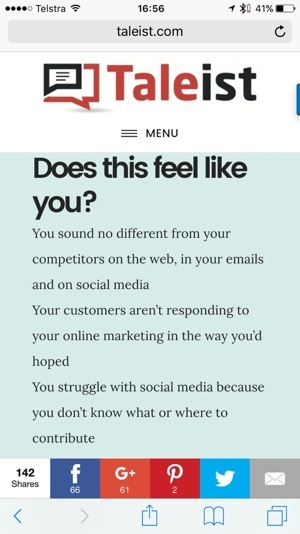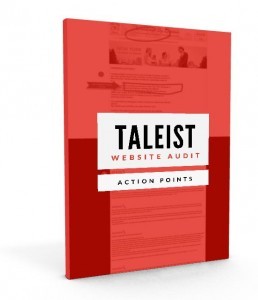7 things you must know about Google if you want it to send customers to your site (and some things Google knows that will blow your mind)
There are only three ways people end up on your website:
You tell them about it
Someone else tells them about it
Google sends them there
If you’re hoping for Google to send potential customers to your, there are some things you need to understand about how Google works.
 Google can feel like a big mystery, but if you understand some basic things, you can go a long way to improving your ranking in Google—especially when you understand who Google’s customer is.
Google can feel like a big mystery, but if you understand some basic things, you can go a long way to improving your ranking in Google—especially when you understand who Google’s customer is.1. Google does only one thing: answer questions
Every search typed into Google is a question and Google responds by listing the webpages it thinks have the best answer to that question. If they type your name into Google, you’ve got a good chance showing up, especially if they type in something a bit descriptive with it, e.g. “Steven Lewis copywriter”. But if you want to show up for something other than your name, read on.
If someone types your name into Google, you’ve got a good chance showing up, especially if they type in something a bit descriptive with it, e.g. “Steven Lewis copywriter”. But if you want to show up for something other than your name, read on.
2. Gold, silver and bronze winners take all
The websites that come at the top of a Google search get the lion’s share of all clicks. The first three sites in any search will gather more than half of all the clicks.
If you’re in the other seven on the first page, you’re fighting for leftovers. If you’re not on page one, forget about it.
3. You are not Google’s customer
You, the website owner, are not Google’s customer; the person searching is the customer.
Everything Google does is about giving its customer, the searcher, a good experience. (Because if they don’t have a good experience, they’ll blame Google and eventually look for another search engine.)
A long time ago there were sorcerer’s tricks to fool Google into thinking a website was a good answer to a question. But Google found them all and smacked those sites out of the listing.
If you work hard to give your visitors a good experience—good content, well laid out—you will be rewarded.
4. Narrow ambition is better
Being at the top of Google for a broad search—”tennis pro” or “shoe shop”—is nearly impossible. Getting there would take serious work and (probably) a shedload of money.
It’s more realistic to aim for narrow searches—”tennis pro in Rozelle” or “shoe shop specialising in heels”. And there’s a better chance someone searching for a tennis pro in your area will buy from you than someone searching from miles away.
 A “responsive” site looks different on a small screen so it’s easier to use. Google punishes non-responsive sites by keeping them out of results shown to people searching on mobile phones.
A “responsive” site looks different on a small screen so it’s easier to use. Google punishes non-responsive sites by keeping them out of results shown to people searching on mobile phones.5. You’re losing a heap of traffic if your site isn’t mobile-ready
Google will not show your website to people searching on their mobile phones if your website is not mobile responsive.
That could be more than half of your potential visitors. (A website that’s mobile responsive is one that adapts itself to a small screen so the user isn’t pinching, zooming or squinting.)
6. Google cares about things you probably haven’t imagined
That includes:
Spelling and grammar—yes, really. Google reasons that people who take their time over their writing are probably giving their visitors a better experience.
How fast your site opens. (Which is a better experience for the Google customer: a site that bursts open or one that oozes in like treacle?)
The quality of the coding on your site
Whether your site is easy to navigate (yes, Google can tell)
7. Google knows things that will blow your mind
Take all the information produced by the software Google has given the world, put it all in one place and you’ve given Google a mind blowing amount of information. Some of it is about you personally and all of it tells Google something about us statistically.
When it comes to how people use your website and what they think of it, Google can draw on information it gets from how they react to you in the search engine. And it can go even deeper if your visitor is using Google’s Chrome web browser or you’ve installed Google Analytics, Google Adwords or a Google remarketing pixel.
Here’s just a handful of things Google might know about your website, e.g.:
How long someone spends on your site. (If Google sends a searcher to a site and they bounce back in five seconds, Google knows the site probably wasn’t much use. It might also get that information from Google Analytics or Chrome)
Which pages on your site are the most popular
Whether people buy things on your site
Whether people email or call you
How your site shapes up to the competition
Whether the writing on your site is original
And it’s using all that to make decisions about where to put you in the search results.
Here’s the good news
You’re running an honest business where you want to give people a product or service that’s worth their money. You want them to have a good experience and you’re genuinely trying to help them.
That means Google wants to help you. Everything Google does is about connecting searchers with good information and great businesses. If that’s you, your goals and Google’s are aligned.
Keep in mind the seven points above and you’ll be a long way down the road to Google helping your business grow.
 Your website review comes with more than 20 pages of actionable tips and insights from our professional analysis of your site
Your website review comes with more than 20 pages of actionable tips and insights from our professional analysis of your siteIf you think your website might not be doing the job you need it to do, get your website professionally reviewed by us
When a single lost customer costs more than a professional website review to fix your website, what are you waiting for?
Have your website reviewed by a professional to identify strengths, weaknesses and areas for improvement. Use those insights to turn a lazy website into a sales tool that grows your business and increases your profits.
The post 7 things you must know about Google if you want it to send customers to your site (and some things Google knows that will blow your mind) appeared first on Taleist.



